The number 10 holds profound significance throughout Scripture, representing divine order, completion, and divine perfection. In Biblical numerology, this number appears consistently in key moments of God’s interaction with humanity, from the 10 Commandments to the 10 Plagues of Egypt. Understanding what the number 10 means in the Bible provides deeper insight into God’s Word and His systematic approach to dealing with His people.
2 Timothy 2:15 – God’s Command To Study
“Study to shew thyself approved unto God, a workman that needeth not to be ashamed, rightly dividing the word of truth.” – 2 Timothy 2:15
This foundational verse emphasizes the importance of diligent study of Scripture. When we examine the spiritual significance of numbers like 10 in the Bible, we’re engaging in the type of careful study that God commands. Biblical numerology isn’t mere superstition but a recognition that God uses numbers symbolically throughout His Word to convey deeper spiritual truths.
The Holy Spirit guides believers in understanding these symbolic meanings, revealing how God’s divine order is woven throughout Scripture. Each occurrence of the number 10 in the Bible carries weight and meaning that contributes to our overall understanding of God’s character and His dealings with humanity.

What Does The Number 10 Mean In The Bible? — Definition
The number 10 in Biblical numerology primarily symbolizes completion, divine order, and divine perfection. Unlike the number 7, which represents spiritual completion, the number 10 specifically denotes completeness of order and the fullness of divine authority. This number appears throughout Scripture in contexts where God establishes order, sets boundaries, or demonstrates His complete authority over creation and humanity.
In contrast to other significant numbers like 3 (divine perfection), 6 (number of man), and 12 (spiritual perfection), the number 10 uniquely represents holiness and divine authority in God’s governmental structure.
Key symbolic meanings of the number 10 include:
- Divine Order: God’s systematic approach to creation and governance
- Completion: The fullness of God’s requirements or judgments
- Divine Perfection: God’s flawless standards and expectations
- Authority: Complete governmental or spiritual authority
- Responsibility: Full accountability before God
- Testing: Complete trials that reveal character
The number 10 often appears when God is establishing covenantal relationships, setting moral standards, or demonstrating His sovereign power. From Genesis through Revelation, this number consistently points to God’s complete and perfect ways of dealing with His creation.
What Does The Number 10 Mean In The Bible? — Tithing and Money
One of the most familiar applications of the number 10 in Scripture relates to tithing – the practice of giving one-tenth of one’s income to God. This practice demonstrates the spiritual significance of the number 10 in acknowledging God’s complete ownership over all our resources.
Biblical tithing represents more than a mere financial transaction. It acknowledges that God owns 100% of everything we possess, and the tithe of 10% serves as a tangible recognition of His lordship over our material blessings. This practice appears throughout the Old Covenant as a fundamental expression of faith and obedience.
Leviticus 27:30 – The Command To Tithe
“And all the tithe of the land, whether of the seed of the land, or of the fruit of the tree, is the LORD’s: it is holy unto the LORD.” – Leviticus 27:30

This verse establishes the divine principle that the tithe belongs to God by right. The Hebrew word for “holy” (qodesh) means “set apart” or “consecrated,” indicating that the tenth portion isn’t merely a suggested offering but something that already belongs to God.
Additional tithing references:
- Leviticus 27:32: “And concerning the tithe of the herd, or of the flock, even of whatsoever passeth under the rod, the tenth shall be holy unto the LORD.”
- Deuteronomy 14:22-23: Details about bringing tithes to the place God chooses
- Malachi 3:10: “Bring ye all the tithes into the storehouse…”
- Proverbs 3:9: “Honour the LORD with thy substance, and with the firstfruits of all thine increase”
The practice of tithing under the Old Covenant demonstrated complete obedience to God’s divine order. While New Testament giving operates under different principles (2 Corinthians 9), the number 10 in tithing established a pattern of recognizing God’s complete authority over our resources.
What Does The Number 10 Mean In The Bible — The Account of Rebekah
The story of Rebekah contains significant occurrences of the number 10 that demonstrate God’s divine order in establishing covenantal relationships. When Abraham’s servant went to find a wife for Isaac, he took ten camels loaded with goods (Genesis 24:10). This wasn’t coincidental but reflected the completeness and adequacy of the provision for this divinely ordained mission.
Genesis 24:22 records that the servant gave Rebekah a golden earring of half a shekel weight and two bracelets of ten shekels weight of gold. The ten shekels represented the complete and generous nature of Abraham’s household and foreshadowed the complete blessing that would come through this union. This account connects to the broader creation story of Genesis 1, where God established divine order from the beginning.
The ten generations from Adam to Noah, and later from Noah to Abraham, demonstrate God’s patience and divine timing in redemption. Jacob, Abraham’s grandson, would continue this pattern of divine blessing through his twelve sons, establishing the tribes of Israel.
The number 10 in Rebekah’s account signifies:
- Complete provision for God’s purposes
- Divine order in establishing covenantal relationships
- Perfect timing in God’s redemptive plan
- Full blessing upon those who align with God’s will
This narrative demonstrates how God uses the symbolism of 10 to indicate His complete involvement in the affairs of His covenant people. Rebekah’s story becomes part of the larger redemptive narrative that leads to Jesus Christ.
What Does The Number 10 Mean In The Bible? — The 10 Plagues of Egypt
The 10 Plagues of Egypt represent one of the most dramatic demonstrations of God’s complete authority over the gods of Egypt and His divine perfection in executing judgment. Each plague systematically dismantled Egypt’s religious system while demonstrating God’s sovereignty over creation. Moses served as God’s instrument in delivering these judgments against Pharaoh and the Egyptian empire.
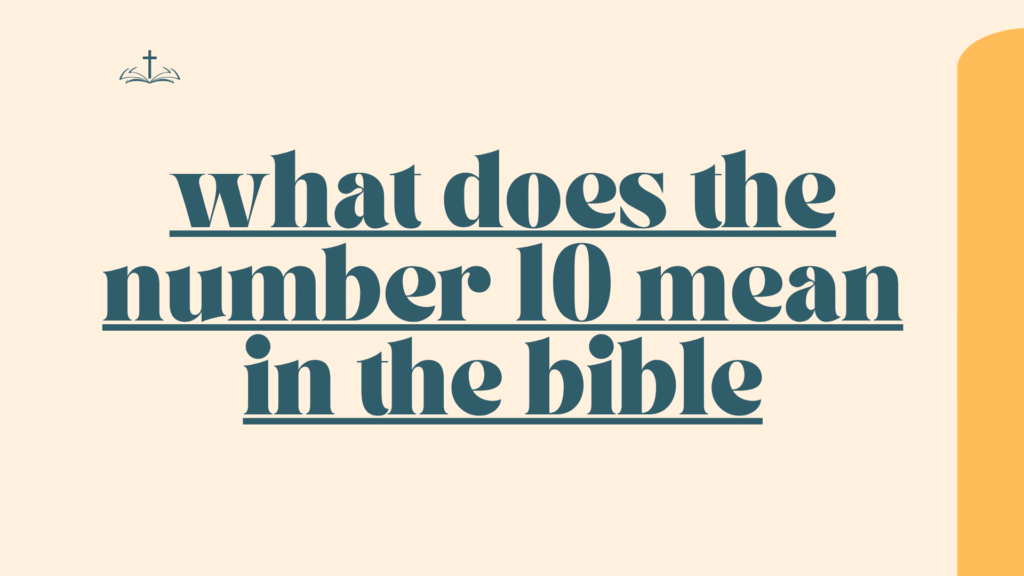
The ten plagues were:
- Water turned to blood (Exodus 7:14-25) – Against the Nile god Hapi
- Frogs (Exodus 8:1-15) – Against the goddess Heqet
- Gnats/Lice (Exodus 8:16-19) – Against the earth god Geb
- Flies (Exodus 8:20-32) – Against Khepri, the beetle god
- Livestock disease (Exodus 9:1-7) – Against Hathor and Apis
- Boils (Exodus 9:8-12) – Against Sekhmet, goddess of healing
- Hail (Exodus 9:13-35) – Against Nut, sky goddess
- Locusts (Exodus 10:1-20) – Against agricultural deities
- Darkness (Exodus 10:21-29) – Against Ra, the sun god
- Death of firstborn (Exodus 11:1-12:36) – Against Pharaoh himself, considered divine
Numbers 33:4 – The Affect Of The 10 Plagues
“For the Egyptians buried all their firstborn, which the LORD had smitten among them: upon their gods also the LORD executed judgments.” – Numbers 33:4
This verse summarizes the complete nature of God’s judgment through the 10 Plagues of Egypt. The number 10 here represents the totality of God’s judgment against Egypt’s false gods and His complete demonstration of power to deliver His people.
Each plague targeted specific Egyptian deities, showing God’s complete supremacy over their entire pantheon. The divine order of the plagues built systematically toward the final, decisive judgment that secured Israel’s freedom.
What Does The Number 10 Mean In The Bible? — The Ten Commandments
The Ten Commandments (Exodus 20, Deuteronomy 5) represent God’s complete moral law and the foundation of divine order for human society. Moses received these commandments directly from God on Mount Sinai, establishing the moral framework that would govern Israel and influence all subsequent kings and rulers. These commandments aren’t arbitrary rules but reflect God’s perfect character and His requirements for righteous living.
Exodus 20 records the original giving of these laws, while Deuteronomy 14 elaborates on their practical applications. The Shekinah Glory of God’s presence accompanied the giving of these laws, demonstrating their divine origin and authority.
The Ten Commandments encompass:
Duties toward God (Commands 1-4):
- No other gods
- No idols
- Don’t take God’s name in vain
- Keep the Sabbath holy
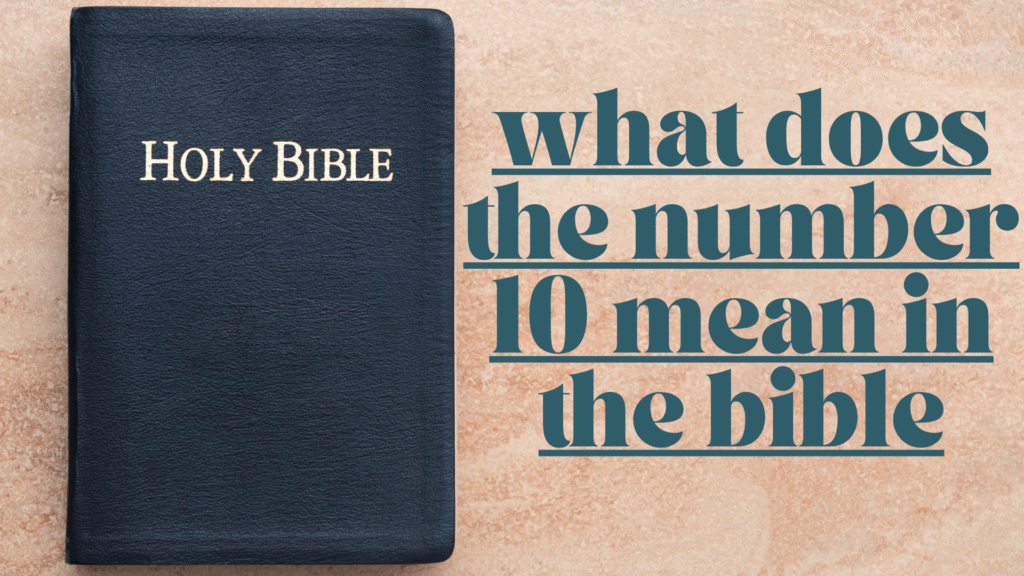
Duties toward others (Commands 5-10):
- Honor parents
- Don’t murder
- Don’t commit adultery
- Don’t steal
- Don’t bear false witness
- Don’t covet
The number 10 here signifies the completion of God’s moral requirements. These commandments cover every aspect of human relationships – both vertical (with God) and horizontal (with others). They represent divine perfection in moral legislation.
Psalm 90:12 reminds us: “So teach us to number our days, that we may apply our hearts unto wisdom.” The Ten Commandments provide the wisdom for numbering our days according to God’s divine order.
What Does The Number 10 Mean In The Bible? — The Tabernacle
The Tabernacle construction included numerous instances of the number 10, demonstrating God’s divine order in worship and His complete provision for approaching His presence. Every detail of the Tabernacle reflected God’s perfect standards and requirements.
Exodus 27:12 – 10 Pillars and 10 Sockets Of The Tabernacle
“And for the breadth of the court on the west side shall be hangings of fifty cubits: their pillars ten, and their sockets ten.” – Exodus 27:12
The Tabernacle court included specific measurements involving the number 10:
- 10 pillars on the west side with 10 sockets
- 10 curtains of fine twined linen (Exodus 26:1)
- Curtains of 10 cubits in various measurements
- 10 bases of silver for the boards
These architectural details weren’t coincidental but reflected God’s divine perfection in establishing the place where He would meet with His people. The number 10 in the Tabernacle represents:
- Complete provision for worship
- Divine order in approaching God
- Perfect standards for holiness
- Full access through proper worship
The Tabernacle served as a type and shadow of Jesus Christ, who perfectly fulfills all of God’s requirements for approaching the Father.
What Does the Number 10 Mean in the Bible? — The Feasts of the Tribes of Israel
The spiritual significance of the number 10 appears prominently in Israel’s sacred calendar and feast celebrations. These observances demonstrate God’s complete order in organizing worship and remembrance throughout the year.
Passover
The Passover celebration involves significant occurrences of the number 10, connecting to God’s complete deliverance of Israel from Egypt through the 10 Plagues of Egypt.
Exodus 12:3 – Instructions For The Passover
“Speak ye unto all the congregation of Israel, saying, In the tenth day of this month they shall take to them every man a lamb, according to the house of their fathers, a lamb for an house.” – Exodus 12:3
The Passover lamb was selected on the tenth day of the first month, demonstrating God’s divine order in redemption. This timing wasn’t arbitrary but reflected the completion of preparation for deliverance. The tenth day represents complete preparation for redemption. Jewish traditions continue to observe Passover today, remembering God’s deliverance from Egypt.
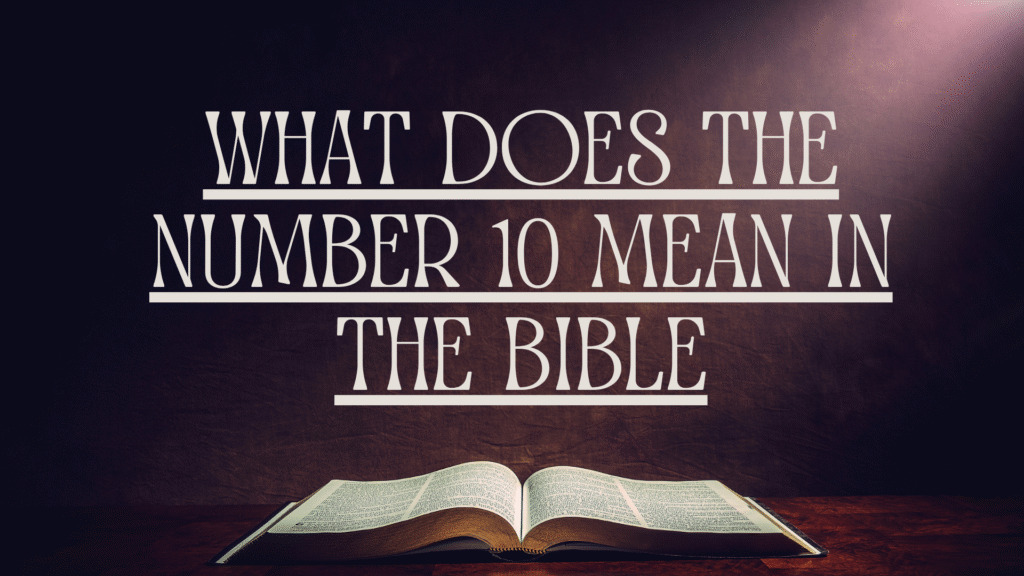
Boaz, the kinsman-redeemer in Ruth’s story, exemplifies this redemption pattern, foreshadowing Jesus Christ as our ultimate Redeemer. The Passover celebration connects to Rosh Hashanah and other significant observances in the Jewish calendar.
Jesus Christ, our Passover lamb (1 Corinthians 5:7), fulfills this typology perfectly, providing complete redemption for all who believe.
Leviticus 25:9 – The Day of Atonement
“Then shalt thou cause the trumpet of the jubile to sound on the tenth day of the seventh month, in the day of atonement shall ye make the trumpet sound throughout all your land.” – Leviticus 25:9
The Day of Atonement (Yom Kippur) occurred on the tenth day of the seventh month, representing God’s complete provision for sin and the fullness of His forgiveness. This holy day, still observed in Jewish traditions today, involved complete cleansing from sin and full restoration of relationship with God through the divine order of the sacrificial system.
The Day of Atonement prefigured Jesus Christ’s complete sacrifice, which provides eternal atonement for sin. The number 10 here emphasizes the totality and sufficiency of God’s provision for redemption.
What Does The Number 10 Mean In The Bible? — The 10th Generation
Biblical genealogies often emphasize the 10th generation as a point of completion or significant transition in God’s redemptive plan. This pattern demonstrates God’s divine order in working through family lines and generations to accomplish His purposes.
Notable 10th generation references:
- Noah was the 10th generation from Adam through Seth’s line
- Abraham represents a new beginning after 10 generations from Noah
- The 10th generation often marks divine transitions in biblical history
The 10th generation principle shows God’s patience and His complete fulfillment of promises across time. Genesis 1 establishes God’s creative order, and the 10th generation patterns show His continued involvement in human history.
What Does The Number 10 Mean In The Bible? — Daniel
The book of Daniel contains significant prophecy involving the number 10, particularly regarding end-times events and God’s complete authority over earthly kingdoms.
Introduction to Babylon
Daniel’s experience in Babylon demonstrates God’s divine order even in captivity. Daniel and his friends were tested for 10 days with their alternative diet (Daniel 1:12-15), and God honored their faith and obedience with perfect health and wisdom.
This 10-day test represents:
- Complete testing of character
- Divine provision during trials
- Perfect vindication of godly living
- Full demonstration of God’s faithfulness
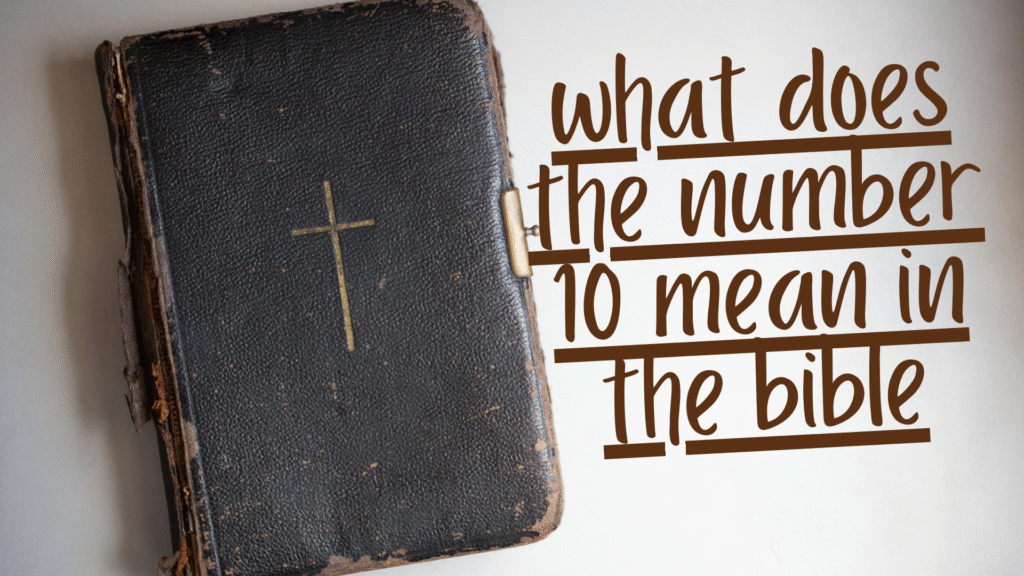
Prophecy in Daniel and Revelation
Daniel’s prophecies connect directly to Revelation’s end-times imagery, particularly regarding the 10 horns that represent complete earthly authority in opposition to God’s kingdom.
Revelation 12:3 – Red Dragon With Ten Horns
“And there appeared another wonder in heaven; and behold a great red dragon, having seven heads and ten horns, and seven crowns upon his heads.” – Revelation 12:3
The red dragon’s ten horns represent complete earthly power in rebellion against God. The number 10 here signifies the totality of Satan’s temporary authority over worldly kingdoms.
Revelation 13:1 – The Beast With Ten Horns and Ten Crowns
“And I stood upon the sand of the sea, and saw a beast rise up out of the sea, having seven heads and ten horns, and upon his horns ten crowns, and upon his heads the name of blasphemy.” – Revelation 13:1
The beast from the sea displays ten horns and ten crowns, indicating complete governmental authority. This imagery connects to Daniel’s prophecies about the final world kingdom before Jesus Christ’s eternal reign.
Revelation 17:3 – Scarlet Beast With Ten Horns
“So he carried me away in the spirit into the wilderness: and I saw a woman sit upon a scarlet coloured beast, full of names of blasphemy, having seven heads and ten horns.” – Revelation 17:3
Revelation 17:7 – Beast With Ten Horns
“And the angel said unto me, Wherefore didst thou marvel? I will tell thee the mystery of the woman, and of the beast that carrieth her, which hath the seven heads and ten horns.” – Revelation 17:7
Revelation 17:12 – Ten Horns Explained
“And the ten horns which thou sawest are ten kings, which have received no kingdom as yet; but receive power as kings one hour with the beast.” – Revelation 17:12
This verse explicitly identifies the ten horns as ten kings who will receive authority for “one hour” with the beast. The number 10 represents the completion of earthly rebellion against God before Jesus Christ establishes His eternal kingdom.
Revelation 17:16 – Revenge Of the Beast With Ten Horns
“And the ten horns which thou sawest upon the beast, these shall hate the whore, and shall make her desolate and naked, and shall eat her flesh, and burn her with fire.” – Revelation 17:16
The ten horns’ destruction of Babylon demonstrates the complete nature of God’s judgment, even using evil to accomplish His righteous purposes.
What Does the Number 10 Mean In The Bible? — The Gospel of John
The Gospel of John contains divine order in its structure and spiritual significance in its numerical patterns. While not explicitly featuring the number 10 as prominently as other books, John’s Gospel demonstrates God’s complete revelation through Jesus Christ.
John records specific signs and discourses that reveal Jesus Christ as the complete fulfillment of God’s redemptive plan. The Holy Spirit inspired John to present Jesus as the perfect revelation of the Father, embodying all aspects of divine perfection.
What Does the Number 10 Mean In The Bible — Other Occurrences
The Evil Report of the 10 Spies
When Moses sent twelve spies to scout the Promised Land, ten returned with an evil report while only Joshua and Caleb trusted God’s promises (Numbers 13-14). The 10 spies represent the completion of unbelief and rebellion against God’s divine order. This account from the book of Numbers demonstrates how the number 10 can represent complete disobedience when people reject God’s promises.
The 10 spies’ fear-based report led to 40 years of wilderness wandering, showing the serious consequences of incomplete faith. This evil report of the 10 spies became a warning for all generations about the dangers of unbelief.
Ten Loaves and Ten Cheeses
1 Samuel 14:17-18 – Gift Of 10 Loaves and 10 Cheeses
The account of David bringing 10 loaves and 10 cheeses to his brothers in Saul’s army demonstrates complete provision and family responsibility. These provisions represent adequate supply for the soldiers and David’s faithful service to his family obligations. This story from 1 Samuel shows David’s character before his famous encounter with Goliath, connecting to the theme of David and Goliath where God’s divine order triumphs over human pride.
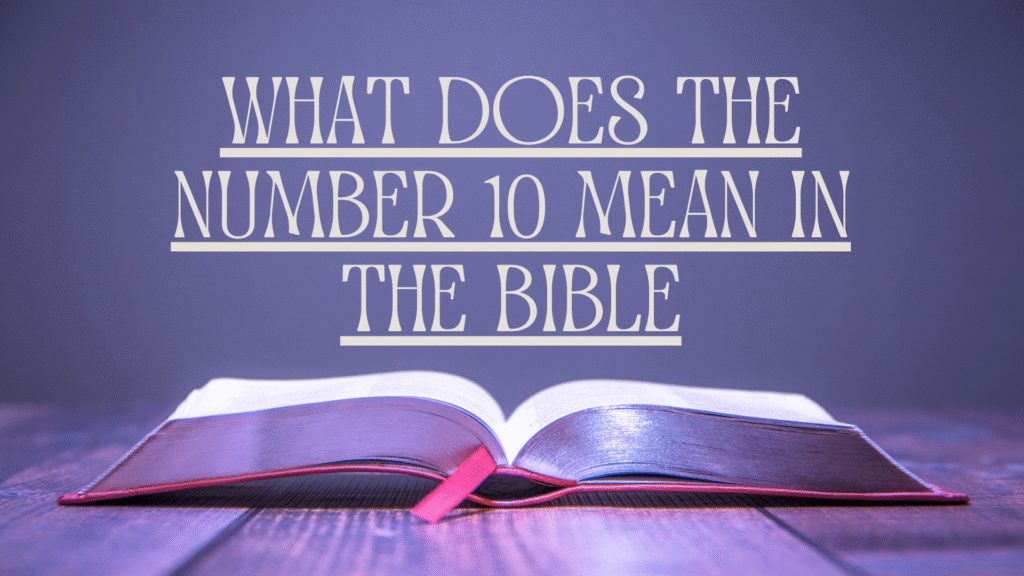
Nabal – Died 10 Days After God Smote Him
1 Samuel 25:37-38 – Nabal Died 10 Days After God Smote Him
“But it came to pass in the morning, when the wine was gone out of Nabal, and his wife had told him these things, that his heart died within him, and he became as a stone. And it came to pass about ten days after, that the LORD smote Nabal, that he died.” – 1 Samuel 25:37-38
Nabal’s death after 10 days represents the completion of God’s judgment against his foolishness and disrespect toward David. The 10-day period allowed time for repentance but ended in divine judgment when none came.
Instrument Of Ten Strings
The Psalms frequently mention instruments of ten strings, representing complete praise and worship to God. These instruments symbolize the fullness of musical expression in glorifying the Creator.
Haman’s Ten Sons
The book of Esther records the execution of Haman’s ten sons (Esther 9:7-10), representing the complete destruction of those who opposed God’s people. Their deaths demonstrate God’s perfect justice in protecting His covenant people.
The Ten Lepers
Jesus healed ten lepers in Luke 17:11-19, but only one returned to give thanks. This miracle from the New Testament demonstrates Christ’s complete power over disease while revealing the incomplete gratitude of most recipients of God’s grace. The ten lepers represent complete healing power of Jesus Christ, divine compassion for human suffering, perfect restoration of health and social standing, and incomplete response to God’s grace (9 out of 10 failed to return thanks).
Ten Days of Tribulation
Revelation 2:10 mentions “ten days of tribulation” for the church in Smyrna, representing a complete period of testing that God allows for His people’s purification and strengthening. This connects to the broader theme of spiritual symbolism throughout Revelation, where numbers carry deep prophetic meaning concerning end-times events and God’s final judgment upon the earth.
Study/Review Questions
10 Commandments, Plagues, and Redemption
Understanding the spiritual significance of the number 10 requires careful study of its major biblical occurrences:
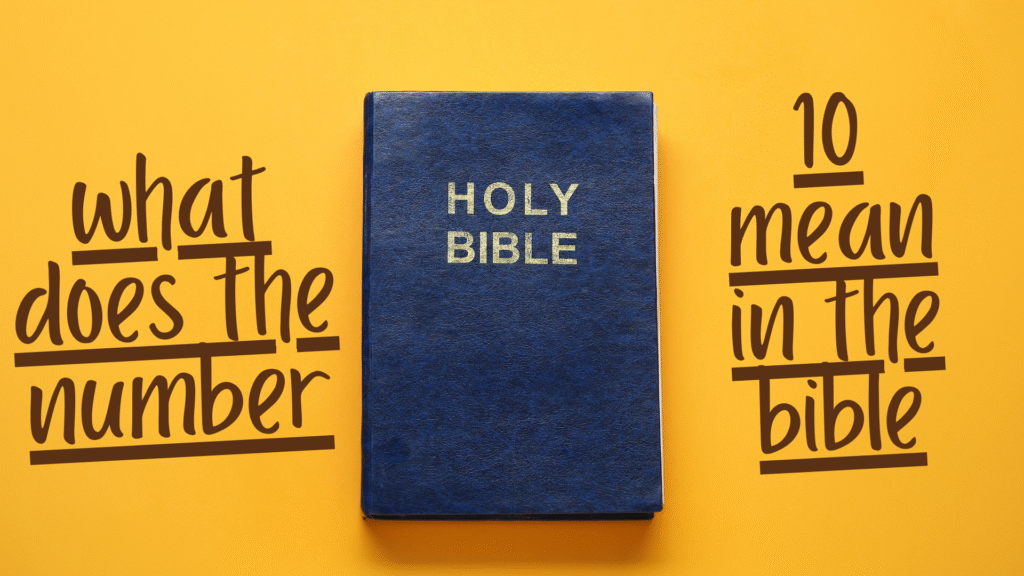
Key study areas:
- How do the Ten Commandments represent complete moral law?
- What does the progression of the 10 Plagues of Egypt teach about God’s divine order in judgment?
- How does tithing demonstrate recognition of God’s complete ownership?
- What role does the number 10 play in biblical prophecy?
Sprinkles of 10
Throughout Scripture, smaller references to the number 10 reinforce its symbolic meaning:
- Ten generations in genealogies
- Ten-day periods of testing
- Ten measures in temple and tabernacle construction
- Ten-fold blessings and judgments
The Lost Books
Some references to “lost books” in Scripture mention numerical patterns that may have included significant uses of the number 10. While these books aren’t part of the biblical canon, they remind us that God’s divine order extends beyond what we currently possess in written form.
Modern Applications and New Testament Understanding
While the Old Covenant emphasized the number 10 in tithing, temple worship, and legal requirements, the New Testament reveals how Jesus Christ fulfills all of God’s complete requirements. The Antichrist and beast with ten horns in Revelation represent the final rebellion against God’s divine order, but Jesus Christ will establish His eternal kingdom.
2 Corinthians 9 teaches about generous giving that goes beyond mere 10% obligations, showing how Christ enables believers to give more abundantly than the law required. The Holy Spirit now guides Christian giving according to faith, ability, and divine calling.
Cultural references to Jewish traditions like Rosh Hashanah and Yom Kippur continue to observe patterns established in the Old Covenant, but Christians understand these as types and shadows fulfilled in Jesus Christ. Mary Jane Humes and other biblical scholars have noted how these patterns point to Christ’s fulfillment of all Old Testament symbolism.
Modern believers can apply the spiritual significance of the number 10 by recognizing God’s complete authority in their lives, practicing obedience to His Word, and understanding that Jesus Christ has perfectly fulfilled all requirements for righteousness and redemption.
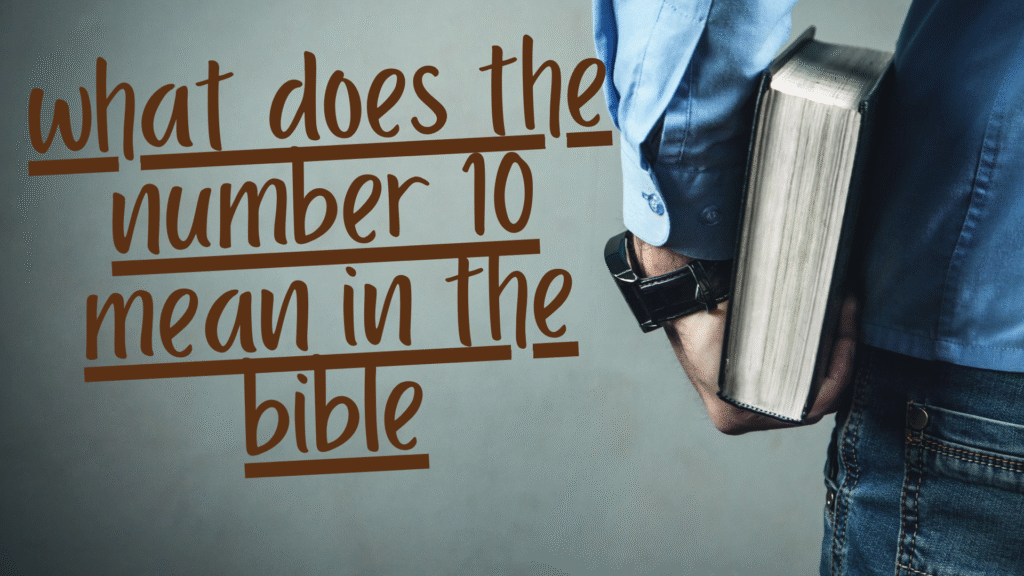
Frequently Asked Questions
What is the meaning of the 10 Angel Number?
While the Bible doesn’t specifically teach about “angel numbers” as understood in popular culture, the number 10 in Scripture consistently represents divine order, completion, and divine perfection. Biblical angels serve God’s purposes according to His complete authority.
What does it mean when you keep seeing 10 Angel Numbers?
Rather than seeking mystical meanings in repeated number sightings, Christians should focus on the biblical spiritual significance of numbers. The number 10 in God’s Word calls believers to recognize His complete authority and divine order in all areas of life.
What is the spiritual significance of the 10 Angel Number?
The spiritual significance of the number 10 lies in its biblical meaning of completion, divine order, and divine perfection. God’s Word uses this number to demonstrate His complete requirements, perfect standards, and total authority over creation.
How does the 10 Angel Number relate to abundance and prosperity?
Biblical tithing (10%) demonstrates that acknowledging God’s complete ownership leads to His blessing. Malachi 3:10 promises that God will “open the windows of heaven” when we bring the full tithe to Him. True prosperity comes from recognizing God’s divine order in our finances.
What role does the 10 Angel Number play in love and relationships?
The number 10 in relationships points to complete commitment and divine order in marriage and family life. Genesis 1 shows God’s perfect design for human relationships, and the Ten Commandments provide the moral framework for loving God and others completely.
Is there a specific message behind seeing 10 Angel Number repeatedly?
Christians should seek guidance from God’s Word and the Holy Spirit rather than looking for mystical meanings in number patterns. The number 10 in the Bible consistently calls believers to recognize God’s complete authority, live in obedience to His divine order, and trust in His perfect timing and provision.
The spiritual significance of the number 10 ultimately points to Jesus Christ, who perfectly fulfills all of God’s requirements and provides complete salvation for all who believe. Whether in the Ten Commandments, the 10 Plagues of Egypt, or the ten horns of Revelation, this number reminds us that God’s ways are perfect and His authority is complete.
Biblical numerology serves not as superstition but as recognition that our God is a God of order who speaks through every detail of His Word. From historical figures like Moses, David, Nabal, and Haman to prophetic visions of the Antichrist and end-times events, the number 10 consistently demonstrates God’s complete authority and divine perfection.
The lost books mentioned in Scripture may have contained additional examples of this numerical pattern, but what we have in the biblical canon provides sufficient understanding of God’s use of the number 10 to represent completion, divine order, and His perfect standards. The number 10 calls us to acknowledge His complete lordship over every aspect of our lives and to live in faith and obedience to His divine perfection.

Catherine Frank, founder of BiblicalHorizon.com, shares daily prayers and Bible verses to nurture spiritual growth. With a lifelong passion for scripture and prayer traditions, she creates accessible spiritual content that resonates with both seasoned believers and newcomers seeking divine connection.



